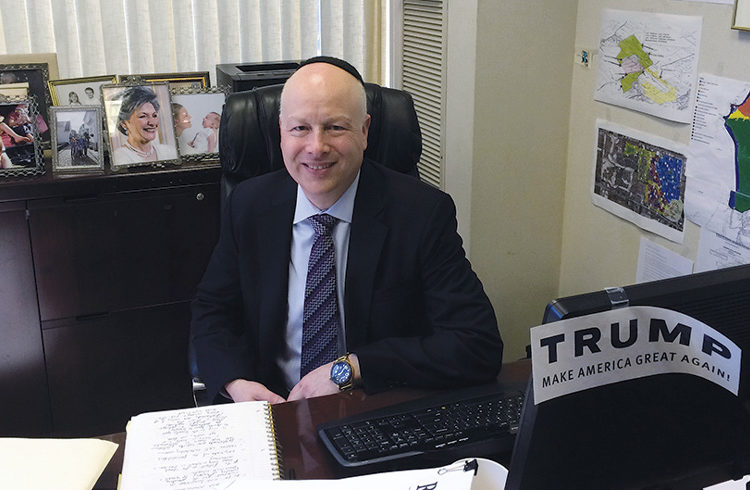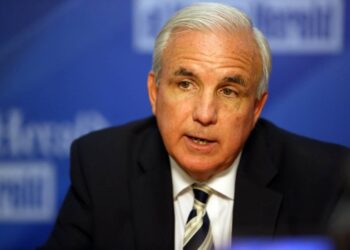Before getting to the White House, Donald Trump did not hide his intentions with regards to Cuba. His critical position toward the rapprochement to the island during the Obama administration was accompanied by the promise to negotiate “a better deal” with Havana.
However, although Trump has not said a word about the island in his first days in the Oval Office, and up to now he has been following his campaign guidelines, some decisions suggest that his electoral discourse about Cuba could in practice be relaxed.
The first sign comes with Jason Greenblatt, named by the U.S. president as the special representative for his government’s international negotiations.
An Orthodox Jew who until December was the lawyer and chief legal officer to the now president and the executive vice president of The Trump Organization, Greenblatt could strengthen the ties with Cuba, giving continuity to Obama’s policies. This was indicated on the Buzzfeed news site, according to which the new negotiator is in favor of connecting both countries.
Greenblatt and his family head non-profit websites and organizations that support stronger and more collaborative international relations, contrary to Trump’s electoral statements and his inaugural speech.
One of these sites, Triplets4ACause, last April published an article that asked for closer ties between U.S. and Cuban adolescents.
“We are of Cuban descent – our grandfather was born and raised there – and we are trying to create deeper connections with Cuban adolescents through communication, exchange of experiences and ties,” says the post on the site that proposes as its cover slogan “helping to make the world a better place.”
Before, in 2014, Greenblatt asked readers from another platform he heads – Inspire Conversation – that they watch Barack Obama’s speech announcing the rapprochement to Cuba, an event which he called a “fascinating moment in history.”
“This is a very important event to discuss with the children who are sufficiently old to understand it,” said the message. “Adolescents, especially, will have the opportunity of exploring a moment in history that did a lot to color today’s diplomacy and international community. It also represents an opportunity for the persons who live so nearby, but have become so distant, to reunite in an inspiring way.”
These statements are not circumstantial given Greenblatt’s own repeatedly expressed personal philosophy.
“My philosophy, in business as well as in life,” the now international negotiator has said, “is that reuniting people and working for unification, instead of dividing, is the strongest road to success. I really believe that this focus is capable of producing results for the United States in the entire world.”
Another possible sign of what the attitude of the new administration toward Cuba could be is that according to news leaks last year, which threatened with torpedoing Trump’s electoral campaign, between 2012 and 2013 Greenblatt traveled to the island with other executives and advisers in search of possible commercial agreements for the present president, even violating the blockade/embargo laws.
The appointment has been received with little enthusiasm by the Cuban Americans who voted for Trump hoping that he reverse or at least freeze the measures for the island promoted by the Obama administration.
However, Greenblatt has not publicly referred to relaxing relations with Cuba or his position with respect to his new post.
During the presidential campaign the negotiator worked as vice president of the Advisory Committee on Israel, a country which he openly defends due to his religion. Thus the Cuban Jews living in Florida see the election of Greenblatt as a promising sign: he could be a potential ally to watch over the island’s Hebrew community.
Some experts even go further. Jaime Suchlicki, who heads the Institute for Cuban and Cuban-American Studies of the University of Miami, is of the opinion that the appointment of an Orthodox Jew as negotiator indicates that Trump is going to review Obama’s Cuba policy.
“It is a sign that the United States will be on Israel’s side and not with the countries opposed to Israel,” Suchlicki affirmed.
Meanwhile, Sebastián Arcos, associate director of the Cubans Research Institute of the International University of Florida, indicated that Greenblatt knows more about Israel and for his decisions about Cuba he could benefit from the experience of the current administration’s Cuban-American advisers.
This vision would situate the international negotiator more in tune with Trump’s electoral discourse.
However, it could be that Jason Greenblatt’s appointment is not the only wink at Cuba by the U.S. president. His proposal for Secretary of Agriculture fell on Sonny Perdue, former governor of Georgia, who also visited the island and has been in favor of business between the two countries.
In 2010, during a three-day trip, the then governor asked for an increase in trade between the United States and Cuba, and affirmed he wished the two countries could improve their relations because “it would be the best result for both nations.”
A Doctor of Veterinary Medicine and an agribusiness sector owner, Perdue has a long record of promoting businesses with other countries. Donald Trump has said that “he has spent his entire life understanding and resolving the challenges our farmers face,” while Roger Johnson, president of the National Association of Farmers, said of him that he expects he will expand “market opportunities for all type of agricultural and livestock production.”
The U.S. agricultural sector is one of the most interested in the normalization of relations between Cuba and the United States, since they see the island as a natural market. U.S. agricultural and livestock products are among those authorized for export to the island, although there are still restrictions that hinder the commercial flow.
Farmers, entrepreneurs and politicians from both parties have stated they are in favor of lifting the commercial restrictions and doing business in Cuba.
Meanwhile, a delegation of Cuban entrepreneurs is visiting the United States until early February. The delegation, made up by executives and officials of state enterprises, is searching for business opportunities and U.S. investment and is promoting the potentials of the Cuban maritime-port sector, especially that of the new deep water port in the Mariel Special Development Zone (ZEDM).
Its program includes meetings with executives from the U.S. Chamber of Commerce and the signing of a memorandum of understanding on port management. In addition, the delegation met with Sylvester Turner, major of the city of Houston, Texas.
During the meeting, the politician insisted on the interest of his city’s business community in increasing commercial ties with the island. He also again suggested taking advantage of the possibilities that his country’s current regulations provide.
The Cuban entrepreneurs’ visit to the United States, a few days after Trump’s inauguration, has also been viewed as a sign of the course relations between the two countries could follow with the new president. To this is added the fact that for the first time in the last half century, Cuban diplomats attended the presidential inauguration ceremony in Washington.
TN: Quotes were translated from the Spanish.










